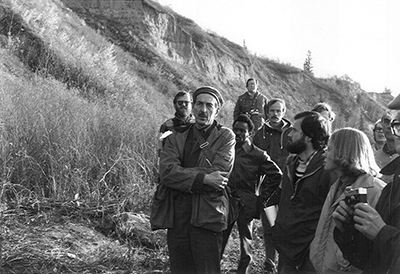
Charlie combined his two loves, field work and teaching, to share his passion with the next generation of geologists. Photo provided by George Pemberton.
"Read thoughtfully."
"Keep learning, and share what you've discovered."
"Teach kids how to ask hard questions."
Dan Chow ('74 BSc) smiles as he recalls some of the more memorable bits of wisdom imparted to him by his mentor, the late Charles Stelck ('37 BSc, '41 MSc, '03 DSc).
Born in Edmonton in 1917, Charles (Charlie) Stelck is considered one of the founders of geology in Alberta. A professor of geology in the Faculty of Science for nearly 35 years, Stelck authored 111 peer-reviewed papers-the last at the age of 98, shortly before his death in 2016. Throughout his illustrious career, Stelck received countless awards, including accolades from the Canadian Petroleum Hall of Fame, the Association of Professional Engineers and Geoscientists of Alberta (APEGA), the Royal Society of Canada, and the Order of Canada. Stelck is also the namesake for an ammonite fossil and Asteroid 187680-Stelck. His pioneering fossil research in Western Canada led to his students' discovery of Alberta's massive oil reserves, including Leduc No. 1 and the Pembina oilfield.
But Stelck's true legacy is those he taught and whose lives he touched. Those like Chow.
A middle child born to immigrant parents, Chow developed a passion for science and education that was crystallized by Stelck during his undergraduate studies.
"My interest in science was fortified by Charlie's teaching methods and encouragement, and that interest provided me with an education that helped me give my family a life that I would never have imagined could be possible."
Chow, a geologist-turned-businessman, honours Stelck by paying it forward, inspiring curiosity in young students through volunteering with Edmonton's youth, bolstering their interest in science, as well as bringing students to campus programs that feature UAlberta's vast museums and collections.
Inspired people inspiring people
For nearly 40 years, Chow has been volunteering with Grade 3 students who are learning about rocks and minerals. It began when he became member of APEGA in 1982. Chow visited many Grade 3 classrooms with road-show kits donated by APEGA and filled with interesting specimens for the students to examine.
"These kits allowed students to physically see and feel what they were working with and provided a link to their textbooks by having a hands-on experience," explains Chow. "I learned that kids are learning sponges, and they were much more engaged in the subject matter when offered something they could physically connect with."
For Chow, the road-show kits also underscored the importance of learning outside of the classroom. So he began to facilitate field trips to UAlberta's campus, bringing these aspiring scientists straight to the source.
"Over the years, I had the pleasure of leading several Grade 3 groups on field trips to see the collection of rocks and to take advantage of the collection on the lawns-our 'outcrops'- along Saskatchewan Drive," says Chow. "I informed the students that they were each geologists for a day and made sure each one of my field crew started out the day with pencils and notebooks in hand. I really encouraged them to really get down on all fours and explore."
The result? An entire classroom of kids thoughtfully examining the world around them, sharing their findings, and asking questions.
"It's too late for me to go back and thank Charlie," Chow says of his late mentor. "I can't say my thanks anymore-so what I'll do is take what he taught me and pass it on."
The lasting legacy of the late greats: Charlie Stelck & George Pemberton
Written by Murray Gingras ('95 Bsc, '99 PhD), Professor, Department of Earth and Atmospheric Sciences
The Charles R. Stelck Chair in Petroleum Geology was established in 2003 to recognize the commitment and contributions of the University of Alberta towards the discovery and development of oil and gas reservoirs in Western Canada.
The first Stelck Chair was Brian Jones, followed by S. George Pemberton, who took over from Jones in 2013. Pemberton's research relating the integration of trace fossils and the sedimentological record led to a revolution in the oil and gas industry. Using Pemberton's approach, petroleum producers could better understand and predict where to explore for oil and gas. Unfortunately, Pemberton passed away in 2018, while still actively teaching and researching at UAlberta. He is sorely missed.
I am the present Stelck Chair, lifting the torch from George Pemberton. The honour is poignant and difficult to describe. I was mentored by Charlie and the first two Stelck chairs-Jones was my undergraduate teacher back in the early '90s. I remember him as an energetic, demanding, accomplished, and excellent teacher. He challenged students to look critically at ideas and interpretations whilst carefully nurturing the students' abilities to present and defend their own ideas.
Professor Stelck was on my PhD supervisory committee. Working with Stelck was a blast. He was about 80 when he joined my committee, and he would create relevant metaphors for life and academia out of almost anything. Charlie was the most intellectual geologist I have ever met, and I suspect that will remain unchanged.
Pemberton ... well, George was my PhD supervisor. It is difficult for people who have not completed a graduate degree to understand what a profound statement that is. George inspired my career as a geologist in every way possible. He was a great teacher, mentor and scientist. We called him "the Jedi."
The tradition of research aimed at petroleum geology in Canada carries on through the legacy of these educators and researchers-and it is now, in part, my responsibility to carry on that legacy. They're big shoes to fill, certainly-but having learned at the feet of Charlie Stelck and the first two Stelck Chairs seems like an ideal start.
The legacy of the late Charlie Stelck lives on. Visit the Origins of the Stelck Chair in Petroleum Geology page to learn more.
